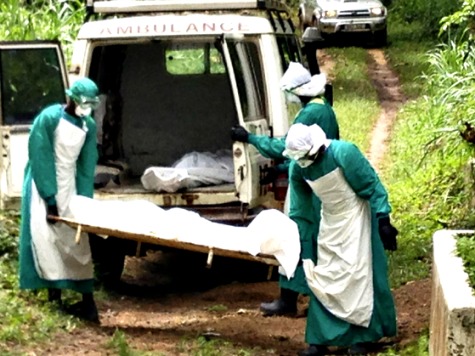Experts speaking to the National Geographic suggest that it is “likely” that the dreaded Ebola virus spreading across West Africa will make its way to the United States, but once here, it is unlikely to spread far, due to advanced American medical technology and the preparedness of medical personnel.
The outbreak, which began in Guinea and has spread to Sierra Leone, Liberia, and Nigeria, has claimed the lives of more than 600 since it was discovered to have been spreading in March. Its arrival in Nigeria has caused significant alarm, as, rather than crossing the border, the victim boarded a flight from Monrovia, Liberia, to Lagos, Nigeria, stopping for a layover in Togo. While no reports have surfaced of further Ebola activity in Nigeria, the possibility of someone infected flying the virus over to new countries has raised concern.
Dr. Stephan Monroe, deputy director of the U.S. Centers for Disease Control and Prevention’s National Center for Emerging and Zoonotic Infectious Diseases, tells National Geographic that the nature of the virus allows for a high chance that someone carrying Ebola will similarly board a flight into the United States. The virus can live inside a person without causing any symptoms for some time, which means infected flyers can board a flight with no obvious symptoms. Ebola is considered significantly less contagious if the person carrying the virus does not exhibit its hallmark symptoms–vomiting, diarrhea, and fever–as it is contracted most easily through contact with the blood or other bodily fluids of a contaminated person.
Dr. Stephen Morse, a virologist at the Mailman School of Public Health at Columbia University, tells the magazine, “Theoretically, there could be enough virus in sweat or saliva to pass on the virus through, say, an airplane armrest or a nearby sneeze.” Someone experiencing a fever could mistake it for a symptom of a different illness and board a plane to North America carrying it, leaving it inside the plane.
Despite the clear threat that the virus will come to the United States, most experts are not worried that it will spread once here. “We do not anticipate this will spread in the U.S. if an infected person is hospitalized here,” CDC Director Tom Frieden said in a statement Tuesday, though he noted that medical experts are being trained in how to handle a person infected with Ebola and how to properly diminish the risk of contaminating others while treating an Ebola patient.
Much of the threat of spreading in West Africa is exacerbated by conditions unlikely or impossible to replicate in the United States. In areas with high Ebola contamination in Sierra Leone and Guinea, instances of villagers attacking medical personnel and hospitals have been documented, as villagers sometimes believe that Western doctors brought the virus to them. Others do not see it as an illness at all, but a curse; thus, they refuse medical care to seek out the help of traditional herbalists and witch doctors. In one instance, a family in Sierra Leone abducted a patient out of a hospital to bring her to a traditional healer, exposing the family, the healer, and his other clients to the virus.
While the virus has not yet appeared in the United States, two Americans working in West Africa have reportedly contracted the virus. Dr. Kent Brantley, a worker with the Christian charity Samaritan’s Purse, contracted the illness while working to heal Ebola patients. Nancy Writebol of the Christian charity Serving in Mission contracted the illness similarly. In Canada, a doctor who had worked with Dr. Brantley has quarantined himself despite not exhibiting symptoms, in the hopes of keeping the virus from spreading in North America.
Elsewhere in the West, the United Kingdom is taking the threat of Ebola extremely seriously. The nation’s Health Protection Agency has put its hospitals “on alert” to identify and treat Ebola symptoms as early as possible, and UK Foreign Secretary Philip Hammond has described it as a “threat” to the nation, though no instances of the virus have been diagnosed in the UK.

COMMENTS
Please let us know if you're having issues with commenting.